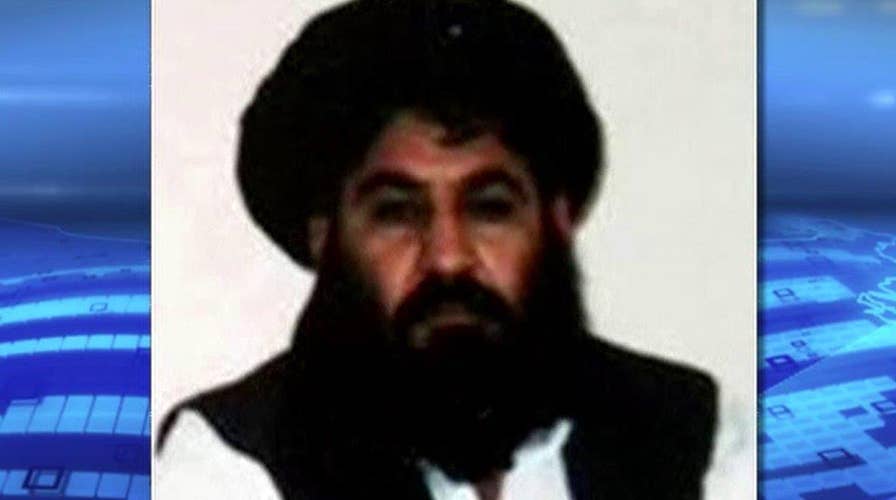US officials: Taliban leader Mullah Mansour 'likely' killed
Authorities say drone strike took place in remote region near the Afghanistan-Pakistan border
In a reminder of the dangers US troops still face in Afghanistan, a US military convoy was attacked by a suicide bomber on Saturday morning and "heavily damaged," an armored vehicle, a Kabul-based US military spokesman tells Fox News.
There were no injuries to the US troops in the convoy, according to a statement from the US-led mission to Afghanistan.
The suicide attack was the third by the Taliban this week. An attack against Afghanistan's Ministry of Interior and a "major" rocket attack in Kabul was thwarted by US and Afghan forces, according to a US defense official in Kabul.
The attack occurred four miles outside Bagram Air Base in northern Afghanistan, where the majority of US forces are based.
The Taliban claimed responsibility for the attack.
A spokesman for Resolute Support, reached by phone by Fox News said the suicide bomber approached the convoy on foot.
In late December, six US Air Force airmen were killed during a foot patrol outside Bagram Air Base.
An estimated 30,000 Taliban fighters remain in Afghanistan, according to Brig. Gen. Charles Cleveland, the US military's top spokesman in Afghanistan. The estimate represents a 20 percent increase over 2009 estimates.
Late last year, the Taliban took over most of Helmand Province in southern Afghanistan. A bumper poppy crop and opium harvest there last month ensured the Taliban have renewed a major revenue source according to officials.
In January, Staff Sgt. Matthew McClintock, 30, a Green Beret, was killed in Helmand while "advising" Afghan special forces there. He was posthumously awarded the Silver Star in March.
A month later, a battalion of roughly 500 US Army soldiers was sent to Helmand to reinforce Afghan Army troops who were forced to retreat from scattered checkpoints.
There are nearly 300 al-Qaeda fighters in Afghanistan, according to Cleveland, who briefed reporters earlier this month.
When asked about the current level of coordination between Al Qaeda and the Taliban, Cleveland said there is evidence the two groups are working "closely" at times.
"We have seen more interaction. We have seen them working more together," Cleveland said. "Bottom line is there is still an Al Qaeda presence here in Afghanistan."
Nearly 10,000 US troops remain in Afghanistan. That number is supposed to be cut in half by the time President Obama leaves office in January.
Nearly 3,000 of those 10,000 are focused on counterterrorism missions against al-Qaeda and ISIS affiliated groups.
There have been more than 120 airstrikes against ISIS and al-Qaeda figures since January.
Earlier this week, Afghanistan's ministry of defense said the US military killed a senior al-Qaeda leader in southern Afghanistan, Mullah Mohammad Ali.
The US military confirmed the strike to Fox News but refused to name the target.
Gen. John W. Nicholson, Jr. the new head of US and allied forces in Afghanistan is nearing the end of his 90-day review period where, at the end of this month, he will make a recommendation to the Pentagon about whether or not the current level of US troops need to stay.
In a closed door session with top US and NATO commanders meeting in Brussels this week, there appeared to be a willingness to maintain the current level of forces in Afghanistan, according to the Washington Post who spoke to top officials following the meetings.









































